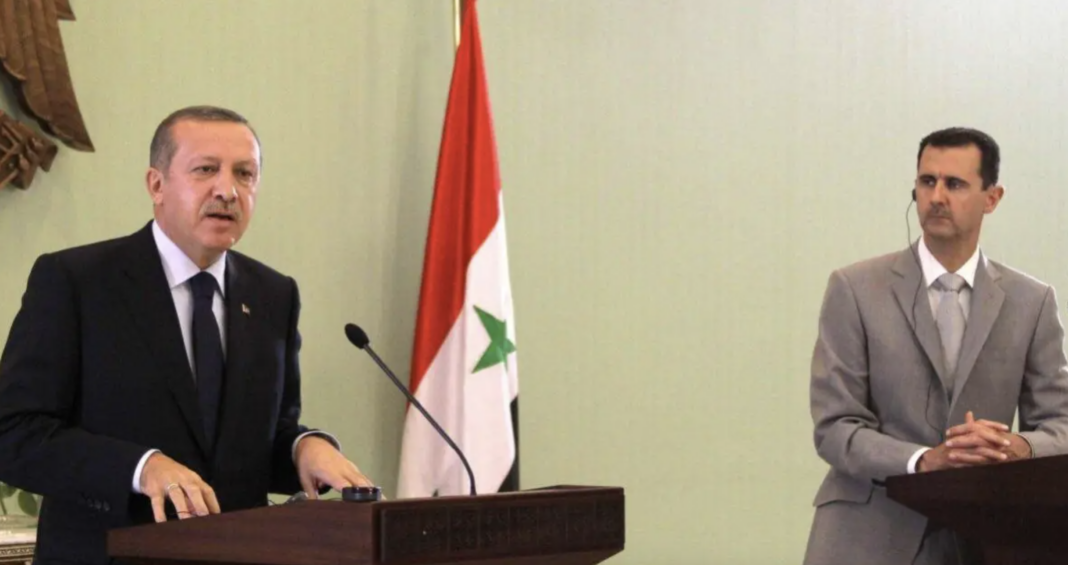A quote from Christopher Nolan’s 2008 blockbuster The Dark Knight could apply to many a political career: “You either die a hero, or you live long enough to see yourself become the villain.” It is a warning, a shot across the bow, that encapsulates so well how, ultimately, hubris and complacency are fundamentally part of the human condition. An individual in power too long can become the antithesis of what they once stood for. Recep Tayyip Erdogan, the President of Turkiye, is an excellent example of this. Recent news that he is working on normalising diplomatic relations with Bashar Assad’s Syria are deeply concerning.
Middle East Monitor, July 6, 2024, by Zaki Kaf Al-Ghazal
Erdogan has been explicit; he is open to meeting Assad himself, not just using intermediaries. These are not the words of a man who is willing to dip his toes in the water to gauge the temperature. There seems to be a commitment here to pursue normalisation, just as most of the Arab world has done following Syria being readmitted to the Arab League last year. Whether this is Erdogan’s implementation of realpolitik or whether he is being pressured, this is deeply unwelcome. Domestically, there is a right-wing movement which is putting pressure on Erdogan to instigate deportations. The decision to take in more than four million Syrian refugees over the past decade has not always been universally popular, and so as economic troubles have worsened, resentment has grown and Syrians have been blamed for stealing Turkish jobs.
The Turkish leader has in the past described the relationship with the Syrian refugees in Turkiye as “Muhajireen and Ansar”, comparing it to the companions who fled from Makkah to Madinah; from persecution to a safe haven during the time of Prophet Muhammad. To go from being described in these terms to feeling that you could be asked to leave the country is a dramatic shift.
Syrians do not want to listen to sweet, but meaningless words. They only want fair treatment, as any human beings would. Moreover, north-west Syria needs to be run by an independent administration, free of Turkish influence.
As Erdogan calls for calm, actions speak louder than words, and his words a few short years ago categorically denying that Turkiye would work with Assad and calling him a murderer now ring hollow. It is ironic that as Turkiye seems to be taking steps to normalise with Assad, a French court has confirmed that an arrest warrant for the Syrian president’s alleged complicity in war crimes and crimes against humanity in the 2013 Ghouta chemical attack is valid. The judgement is a real landmark, and the first time a sitting head of state has been recognised by a national court not to have total personal immunity. The Paris Court of Appeal confirmed the validity of the warrant, stating that this immunity can be lifted by non-international courts. Moreover, last year, Canada and the Netherlands filed a joint application at the International Court of Justice against Syria stipulating that it has failed to fulfil its international obligations to prohibit torture and other forms of cruel, inhuman or degrading treatment in line with the Convention against Torture.
Moreover, the US House of Representatives passed the Assad Regime Anti-Normalisation Act last year which ensures that any efforts made by the government to normalise relationships with the regime in Damascus are blocked. The Act also includes the ability to sanction individuals and organisations working with the Syrian government. So, if the Biden or any future administration make serious efforts to begin normalisation, they should be unable to do so. Arab states have gained little from normalisation; Assad has made no real concessions, and the gamble by the Arab League to try to bring him back into the geopolitical fold has been a total failure. The entry of humanitarian aid is as restricted as ever, the captagon drug trade continues unabated, and work towards fulfilling UN Security Council Resolution 2254 calling for a ceasefire and political settlement in Syria is as non-existent as it was on 18 December 2015.
Universal jurisdiction offers avenues for survivors outside Syria to hold the perpetrators of heinous crimes to account. Tentative steps toward transitional justice can start. Germany sentenced former Syrian intelligence official Anwar R to life in prison for crimes against humanity, and efforts to bring regime figures to account, whilst slow, are ongoing.
With accountability gaining traction, Erdogan choosing to pursue normalisation with Assad is not only morally wrong, but also seems to be a strategic mistake. For a figure who has courted controversy over the past decade in Turkiye but has until recently been held in high esteem by Syrians, he is quickly burning any goodwill he may have left. It is not too late for him to change direction and take a stand against normalisation. He should do so without delay.

